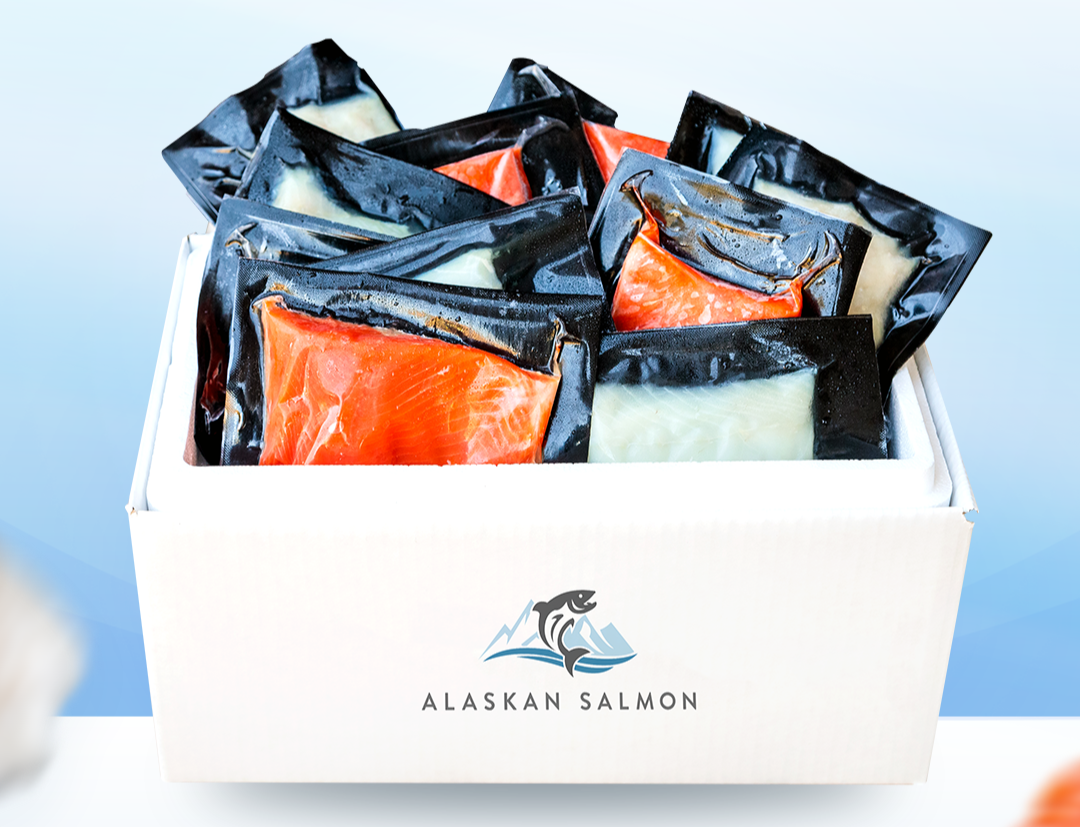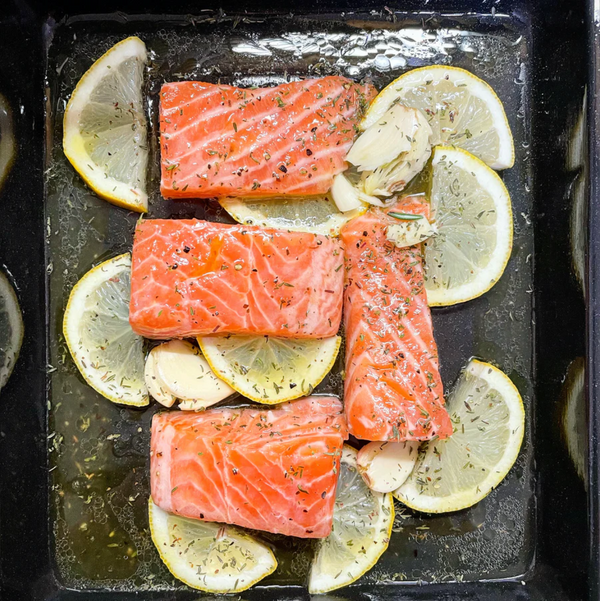How Much Salmon is Too Much? Recommended Salmon Intake By Experts
Updated on Jun 05, 2022
Salmon is one of the healthiest fish you can eat. It’s packed with protein, healthy fats, and vitamins that are good for your heart, brain, and overall health. But just like any food, eating too much can have downsides.
That’s why experts have set a recommended salmon intake to help you get the benefits without the risks. If you’ve ever asked, “How often should you eat salmon?” this guide will walk you through what’s safe for adults, kids, pregnant women, and people with certain health conditions.
How Much Salmon is Too Much?
Most health experts, including the U.S. Food and Drug Administration (FDA) and the American Heart Association (AHA), suggest eating about two servings of salmon per week, with each serving being 4 ounces of cooked fish.
This amount balances salmon’s health benefits — like omega-3 fatty acids, protein, and vitamins — with the small but possible risks of mercury and other contaminants.
While two servings per week is a general rule, the ideal amount can vary depending on your age, life stage, and health needs.
Recommended Salmon Intake for Adults
For most healthy adults, 8–12 ounces of salmon per week is considered safe and beneficial. This can be split into two or three meals. Wild-caught salmon is a great choice for higher omega-3 content, while farmed salmon can still be a healthy option if consumed in moderation.
Recommended Salmon Intake for Children
The FDA recommends smaller portions for children, based on age:
-
Ages 1–3: About 1 ounce per serving
-
Ages 4–7: About 2 ounces per serving
-
Ages 8–10: About 3 ounces per serving
- Ages 11 and older: Adult portion sizes (4 ounces per serving)
Salmon is low in mercury, which makes it one of the safer fish for kids to eat regularly, but serving sizes should match their smaller bodies.
Recommended Salmon Intake for Pregnant and Nursing Woman
The FDA and Environmental Protection Agency (EPA) recommend 8–12 ounces of low-mercury fish per week for pregnant or breastfeeding women.
Salmon is one of the “best choice” fish for this group because of its low mercury levels and high DHA, an omega-3 fatty acid important for babies’ brain and eye development. Avoid raw or undercooked salmon to reduce the risk of foodborne illness.
Related: Can You Eat Salmon While Pregnant?
Recommended Salmon Intake for People with Medical Conditions
For people with high cholesterol or heart disease, the AHA recommends eating at least two servings of oily fish like salmon per week to help reduce triglycerides and support heart health.
In some cases, a doctor or dietitian may advise more frequent servings, but it’s still important to keep total weekly fish intake within 12 ounces to avoid excess calories and contaminants.
Choose baked, grilled, or steamed salmon instead of fried to keep the meal heart-friendly.
Does the Type of Salmon Affect How Much You Can Eat?
Yes — the type of salmon you choose can influence how often you should eat it. While all salmon provide protein, omega-3s, and other valuable nutrients, each variety has unique factors that may affect your recommended salmon intake.
Wild salmon typically has fewer calories and less fat, yet slightly more omega-3s per ounce. It also tends to have lower levels of certain contaminants, depending on where it’s caught.
Farmed salmon, by contrast, is usually higher in fat (including omega-3s) but may contain more pollutants like PCBs, depending on farming practices. According to the FDA, farmed salmon is still safe when eaten in recommended amounts — about two servings per week.
Choosing high-quality, responsibly farmed salmon can further reduce potential risks.
Related: Wild Caught vs. Farm Raised Salmon
Raw salmon, enjoyed in dishes like sushi or poke, can be safe if it’s sushi-grade and handled correctly. However, eating raw fish too often increases the risk of foodborne illness from bacteria or parasites.
To lower this risk, balance raw salmon meals with cooked salmon, and note that pregnant or immunocompromised individuals should avoid raw salmon entirely.
Smoked salmon offers rich flavor and convenience, but it’s often high in sodium, which can raise blood pressure and stress the heart.
If you eat smoked salmon regularly, keep portions small (2–3 ounces) and mix it up with fresh or cooked salmon options. Pregnant women should avoid cold-smoked salmon because it can carry harmful bacteria.
Related: Is Smoked Salmon Good for You?
Canned salmon is an affordable, shelf-stable option that’s often made from wild salmon. It retains its omega-3s and nutrients and is cooked during processing, which makes it safe for pregnant women and children.
To keep sodium in check, look for low-sodium varieties. Canned salmon can count toward your total weekly salmon servings.
Summary
Salmon is a nutrient-rich food that can be part of a healthy diet for most people, as long as you follow the recommended salmon intake of about two servings per week. This gives you the benefits of omega-3 fatty acids, lean protein, and essential vitamins, while keeping potential risks low.
Choosing your salmon carefully — whether fresh, frozen, canned, or smoked — helps you enjoy variety and flavor without overdoing it.
Consider trying our wild sockeye salmon and wild king salmon. Our wild sockeye and king salmon is naturally rich in omega-3s, low in contaminants, and sustainably sourced from pristine Alaskan waters — a choice you can feel good about!
FAQs
Can you eat salmon every day?
You can eat salmon more than twice a week if you vary your diet and choose low-mercury fish, but experts recommend averaging two servings per week to strike the best balance between benefits and safety.
Eating it daily on occasion is generally fine for healthy adults, but if you have specific health conditions, check with your healthcare provider.
Is it safe to eat raw salmon regularly?
Raw salmon can be safe if it’s sushi-grade and prepared by trusted sources. However, eating it frequently raises the risk of parasites and bacteria.
For most people, it’s best enjoyed occasionally, with cooked salmon making up the bulk of your intake. Pregnant, breastfeeding, or immunocompromised individuals should avoid raw salmon.
Is salmon high in mercury?
No, salmon is considered a low-mercury fish compared to many others, making it one of the safer seafood choices. However, mercury can still build up if you eat large amounts over time, so it’s best to stick to the recommended salmon intake to keep your exposure low.








